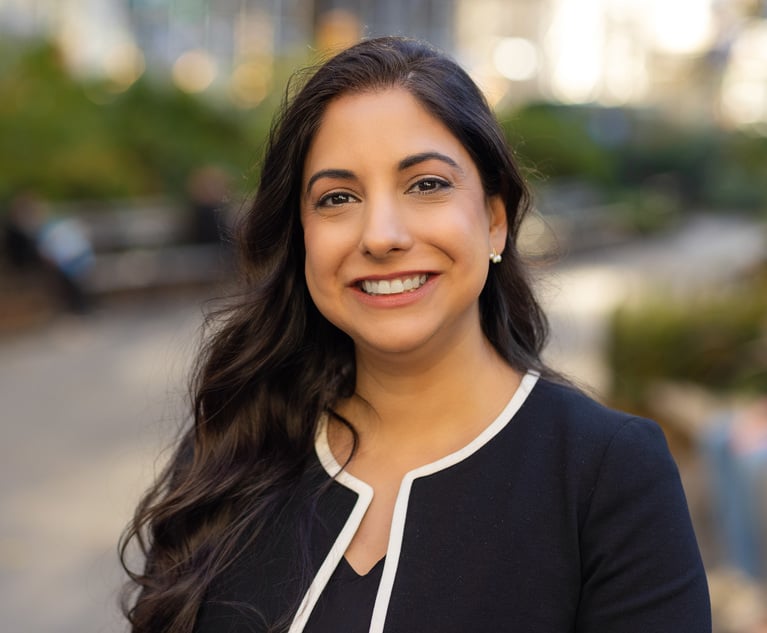Personal Injury Plaintiff's Devices, Social Media Accounts Should Be Made Available to Defense, Court Rules
Kenneth Pinczower of McDonald & Safranek said that the First Department's ruling will have a “major impact” for discovery in personal injury cases.
January 24, 2019 at 05:35 PM
4 minute read

In a blow to personal injury plaintiffs, a state appeals court in Manhattan ruled that a defendant's data mining expert may scour a plaintiff's electronic devices and email and social media accounts for evidence of physical activity following a motor vehicle accident.
The ruling by the Appellate Division, First Department, came on the New York Court of Appeals' decision last year to give a defendant access to materials from a plaintiff's Facebook account that had been deemed private as part of discovery in a personal injury suit in which the plaintiff alleged that she was injured after she fell from the defendant's horse.
In a signed decision in Forman v. Henkin, handed down in last February, Chief Judge Janet DiFiore wrote for a unanimous court that limiting discovery to a litigant's public posts on Facebook runs counter to New York's tradition of liberal discovery.
With a brief, two-paragraph ruling issued on Thursday in Vasquez-Santos v. Matthew, a five-judge panel from the First Department pushed the envelope even further for defendants and granted a motion to compel to allow an expert to cast a wider dragnet through the plaintiff's electronic devices, including through email accounts and other social media platforms such as Twitter and WhatsApp, and for deleted materials, tags and documents.
Kenneth Pinczower of McDonald & Safranek, which works as house counsel for Nationwide Insurance, said that the First Department's ruling will have a “major impact” for discovery in personal injury cases, in which juries are often left to make judgment calls on the credibility of the parties in the case.
“With the use of technology, we can now recapture and obtain photographs, videos, emails, texts and social media postings created by the plaintiffs themselves that contradict their current claims of injury and challenge their current claim as to how the incident occurred,” Pinczower said. “This is a very powerful tool that can and should be used by counsel to challenge the credibility of the plaintiff and will help the jury determine the truth.”
Howard Cohen of William Schweitzer & Associates, which represents plaintiff Genaro Vasquez-Santos, did not respond to a request for comment.
Vasquez-Santos used to play semi-professional basketball but he alleges that he became disabled and had to give up playing after a August 2013 motor vehicle accident in which his vehicle collided with one being driven by defendant Leena Matthew on the Palisades Parkway in Rockland County.
Vasquez-Santos filed suit in Manhattan and, following the accident, photographs depicting Vasquez-Santos playing basketball were posted to social media, which Matthew's counsel obtained.
Vasquez-Santos claims that the photos are from a year before the accident, Pinczower said. Pinczower filed a motion to compel production of the metadata associated with the photos; a motion to obtain the metadata from Facebook, which is not a party to the case, was refused by Facebook's counsel.
The attorney then moved to allow a third-party data miner to search through Vasquez-Santos' devices, but Manhattan Supreme Court Justice Adam Silvera denied the motion, finding that Matthew was trying to get access to electronic devices that were irrelevant to Vasquez-Santos' injury.
The judge said that Matthew already had copies of photographs of Vasquez-Santos engaged in physical activity and that it should be up to jury to decide if they were taken before or after the accident.
But, in its order reversing Silvera, a First Department panel comprised of Justices John Sweeny Jr., Peter Tom, Marcy Kahn, Jeffrey Oing and Anil Singh said that Matthew is entitled to discovery to rebut the plaintiff's claims that the photos were taken before the accident.
Read more:
Court of Appeals Declares Facebook 'Private Data' and Other Social Media Subject to Discovery
NY Top Court: Private Facebook Postings Not Off Limits in Discovery
This content has been archived. It is available through our partners, LexisNexis® and Bloomberg Law.
To view this content, please continue to their sites.
Not a Lexis Subscriber?
Subscribe Now
Not a Bloomberg Law Subscriber?
Subscribe Now
NOT FOR REPRINT
© 2025 ALM Global, LLC, All Rights Reserved. Request academic re-use from www.copyright.com. All other uses, submit a request to [email protected]. For more information visit Asset & Logo Licensing.
You Might Like
View All

Family Law Practitioners Weigh In on Court System's New Joint Divorce Program

Former NY City Hall Official Tied to Adams Corruption Probe to Plead Guilty

New Charges Expected in Sex Trafficking Case Against Broker Brothers
Trending Stories
- 1With DEI Top of Mind, Black Judges Discuss Growing Up During Segregation, Efforts to Diversify the Profession
- 2Big Law's Middle East Bet: Will It Pay Off?
- 3'Translate Across Disciplines': Paul Hastings’ New Tech Transactions Leader
- 4Milbank’s Revenue and Profits Surge Following Demand Increases Across the Board
- 5Fourth Quarter Growth in Demand and Worked Rates Coincided with Countercyclical Dip, New Report Indicates
Who Got The Work
J. Brugh Lower of Gibbons has entered an appearance for industrial equipment supplier Devco Corporation in a pending trademark infringement lawsuit. The suit, accusing the defendant of selling knock-off Graco products, was filed Dec. 18 in New Jersey District Court by Rivkin Radler on behalf of Graco Inc. and Graco Minnesota. The case, assigned to U.S. District Judge Zahid N. Quraishi, is 3:24-cv-11294, Graco Inc. et al v. Devco Corporation.
Who Got The Work
Rebecca Maller-Stein and Kent A. Yalowitz of Arnold & Porter Kaye Scholer have entered their appearances for Hanaco Venture Capital and its executives, Lior Prosor and David Frankel, in a pending securities lawsuit. The action, filed on Dec. 24 in New York Southern District Court by Zell, Aron & Co. on behalf of Goldeneye Advisors, accuses the defendants of negligently and fraudulently managing the plaintiff's $1 million investment. The case, assigned to U.S. District Judge Vernon S. Broderick, is 1:24-cv-09918, Goldeneye Advisors, LLC v. Hanaco Venture Capital, Ltd. et al.
Who Got The Work
Attorneys from A&O Shearman has stepped in as defense counsel for Toronto-Dominion Bank and other defendants in a pending securities class action. The suit, filed Dec. 11 in New York Southern District Court by Bleichmar Fonti & Auld, accuses the defendants of concealing the bank's 'pervasive' deficiencies in regards to its compliance with the Bank Secrecy Act and the quality of its anti-money laundering controls. The case, assigned to U.S. District Judge Arun Subramanian, is 1:24-cv-09445, Gonzalez v. The Toronto-Dominion Bank et al.
Who Got The Work
Crown Castle International, a Pennsylvania company providing shared communications infrastructure, has turned to Luke D. Wolf of Gordon Rees Scully Mansukhani to fend off a pending breach-of-contract lawsuit. The court action, filed Nov. 25 in Michigan Eastern District Court by Hooper Hathaway PC on behalf of The Town Residences LLC, accuses Crown Castle of failing to transfer approximately $30,000 in utility payments from T-Mobile in breach of a roof-top lease and assignment agreement. The case, assigned to U.S. District Judge Susan K. Declercq, is 2:24-cv-13131, The Town Residences LLC v. T-Mobile US, Inc. et al.
Who Got The Work
Wilfred P. Coronato and Daniel M. Schwartz of McCarter & English have stepped in as defense counsel to Electrolux Home Products Inc. in a pending product liability lawsuit. The court action, filed Nov. 26 in New York Eastern District Court by Poulos Lopiccolo PC and Nagel Rice LLP on behalf of David Stern, alleges that the defendant's refrigerators’ drawers and shelving repeatedly break and fall apart within months after purchase. The case, assigned to U.S. District Judge Joan M. Azrack, is 2:24-cv-08204, Stern v. Electrolux Home Products, Inc.
Featured Firms
Law Offices of Gary Martin Hays & Associates, P.C.
(470) 294-1674
Law Offices of Mark E. Salomone
(857) 444-6468
Smith & Hassler
(713) 739-1250






